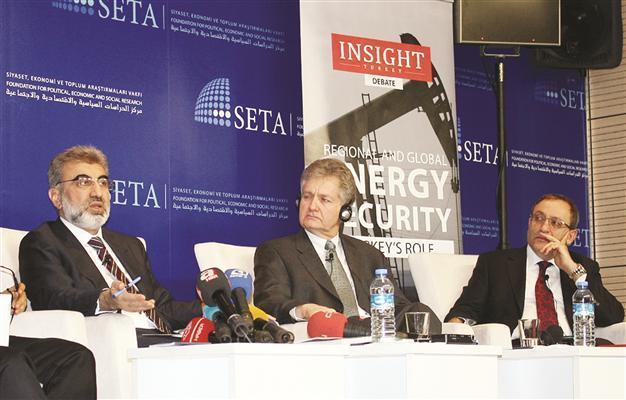Energy Minister admits bad choices for hydro plants’ locations
ANKARA

Energy Minister Taner Yıldız speaks at a panel titled “Regional and Global Energy Security: Turkey’s Role,” hosted by the Foundation for Political, Economic and Social Research (SETA) in Ankara. AA photo
Energy Minister Taner Yıldız has publicly admitted that some of hydroelectric power plants have been built in controversial areas, but still lays blame at the door of contractors.
Speaking at a panel focusing on Turkey’s energy policy on March 7, Yıldız blamed certain contractors for their “loutish approach” in building hydroelectric power plants.
“We do not want to build power plants to the detriment of the environment,” he said. “We don’t want to work on projects that go against the environment. We want to work with the environment. Turkey’s energy and natural resources are its wealth, and so are its historical assets. Prioritizing the former does not mean sacrificing the latter,” Yıldız added, speaking at the panel titled “Regional and Global Energy Security: Turkey’s Role,” which was hosted by the Foundation for Political, Economic and Social Research (SETA).
The building of hydroelectric power plants has long drawn objections from both locals where the plant was to be built and from environmentalists. Most of these plants have still been built, despite protests, and in some of the demonstrations police have used disproportionate force, leading to further controversy.
Despite this, Yıldız said a distinction should be made between good-faith protesters and manipulative environmentalist movements that he claimed were aiming to halt progress in Turkey through these protests.
‘Oil projects will help normalization in Iraq’Yıldız noticeably refrained from going into details of the current state of affairs regarding Turkey’s cooperation with the Iraqi Kurdistan Regional Government (KRG), despite objections from Baghdad. He did suggest, however, that any Turkish state or private sector-led oil projects in northern Iraq would contribute to the normalization of tensions in Iraq. “Oil revenues from southern Iraq or northern Iraq belong to the whole of Iraq, this is the Iraqi central government’s red line and we totally agree with that,” Yıldız said.
When asked about the accuracy of recent media reports claiming that Turkey had assured Iraq’s central government that it would not make an energy deal with the KRG without Baghdad’s consent, Yıldız declined to deny or confirm the reports. “The main factor for Iraq’s normalization is the [energy] projects to be developed there. The more projects are developed, the more Iraq will be normalized ... We will not remain indifferent and support any project that would contribute to the normalization of Iraq, as our neighbor and ally,” he said.
The Turkish energy sector has suffered from military coups during the republic’s history, according to Yıldız. He said that Turkey had first decided to set up a nuclear power plant in 1956, but the idea was not concretized until the Justice and Development Party (AKP) came to power.
Yıldız also said that Turkey had plans to make state-run Turkish Petroleum Corporation (TPAO) and the Turkish Petroleum Pipeline Corporation (BOTAŞ) into international actors in the energy sector. Stressing that a majority of the TPAO’s revenues currently depended on its operations in Azerbaijan and in other third countries. they were making preparations for TPAO and BOTAŞ to take a more pioneering role in operations abroad.
